英语知识点复习
初中英语总复习(全册)知识点归纳
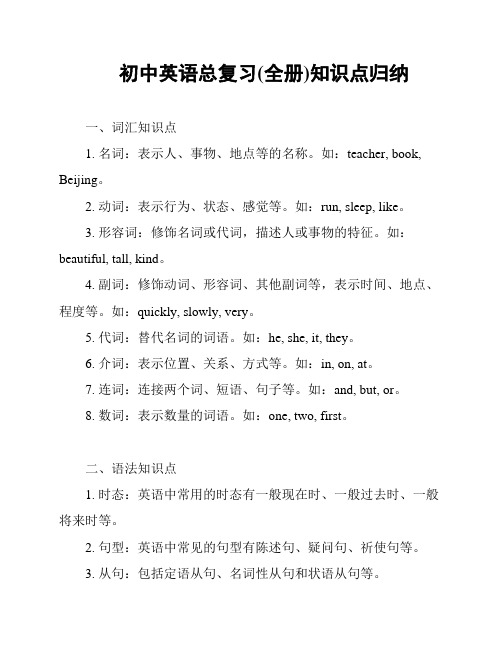
初中英语总复习(全册)知识点归纳一、词汇知识点1. 名词:表示人、事物、地点等的名称。
如:teacher, book, Beijing。
2. 动词:表示行为、状态、感觉等。
如:run, sleep, like。
3. 形容词:修饰名词或代词,描述人或事物的特征。
如:beautiful, tall, kind。
4. 副词:修饰动词、形容词、其他副词等,表示时间、地点、程度等。
如:quickly, slowly, very。
5. 代词:替代名词的词语。
如:he, she, it, they。
6. 介词:表示位置、关系、方式等。
如:in, on, at。
7. 连词:连接两个词、短语、句子等。
如:and, but, or。
8. 数词:表示数量的词语。
如:one, two, first。
二、语法知识点1. 时态:英语中常用的时态有一般现在时、一般过去时、一般将来时等。
2. 句型:英语中常见的句型有陈述句、疑问句、祈使句等。
3. 从句:包括定语从句、名词性从句和状语从句等。
4. 否定形式:在英语中通过在句子中加入否定词来表示否定的意思。
5. 疑问形式:在英语中通过改变句子语序或加入疑问词来构成疑问句。
6. 介词短语:一种由介词和它的宾语构成的结构,用来修饰名词或动词。
三、阅读技巧1. 抓主题:阅读时要注意抓住文章的主题,从中找出关键信息。
2. 理解词义:通过上下文,猜测不认识的单词的意思。
3. 推理推断:通过已知信息进行推理,得出未知信息。
4. 划重点:将文章中所述的重要信息标记出来,有助于记忆和理解。
5. 阅读速度:提高阅读速度的技巧有先读标题、段落开头和结尾。
以上是初中英语总复的知识点归纳,希望对你的复有所帮助!。
(完整版)英语知识点总结

完整版)英语知识点总结1.语法知识点1.1 时态英语中有多种时态,包括一般现在时、一般过去时、一般将来时、现在进行时等等。
掌握各个时态的用法对于正确表达时间和叙述事件非常重要。
1.2 语态语态分为主动语态和被动语态,主动语态强调动作的执行者,被动语态强调动作的承受者。
熟练运用被动语态可以使句子更加流畅和易读。
1.3 从句英语中的从句包括名词性从句、定语从句和状语从句。
学习如何使用从句可以丰富句子结构,使表达更加准确。
2.词汇知识点2.1 同义词英语中同义词的使用可以使语言更加丰富多样,提高表达的灵活性和准确性。
但要注意同义词的使用场景和语境。
2.2 熟语熟语是一种特定的固定短语或表达方式,具有特定的含义。
掌握常用的熟语可以使语言更加地道和自然。
2.3 词根词缀英语中有许多词根词缀,可以通过分析词尾或前缀来理解单词的含义。
熟练掌握常见的词根词缀可以帮助理解和记忆大量词汇。
3.阅读技巧3.1 推测词义阅读时遇到不认识的词汇时,可以通过上下文推测词义。
注意关注词语的前后文以及句子的主题,有助于理解并推测词语的含义。
3.2 主旨理解阅读时要抓住文章的主旨,从整体上理解文章的内容和意义。
可以注意文章的标题、首尾段落以及关键词等来把握文章的主题。
3.3 阅读技巧阅读时适当使用标记和笔记,帮助记忆和理解。
可以用不同的颜色标记关键信息、重点句子或难点词汇,同时可以在边缘或空白处做简单的笔记。
4.写作技巧4.1 写作结构一篇英语文章通常包括引言、主体和结论。
合理的写作结构可以使文章内容更加有条理,逻辑清晰。
4.2 连接词使用适当的连接词可以使文章段落之间的过渡更加自然流畅。
常用的连接词有and。
but。
however。
therefore等。
4.3 语法和标点符号在写作中要注意语法和标点符号的正确使用,例如句子的主谓一致、使用适当的标点符号等。
这可以使写作更加准确和易读。
以上是英语知识点的一些总结,希望对您的学习有所帮助。
小升初英语常考知识点汇总复习

小升初英语常考知识点汇总复习一、词汇1.介词:- in 在(大、小)、在(年、月、星期)、在(户外活动)- on 在(地图上)、在(表面)、在(大、小)、在(星期和日期)、在(具体场所)- at 在(时刻)、在(大、小)、去(地)- for 为了、给予- with 和谁在一起- to 给予、换- from 来自- of 属于、..的一部分、in the mornig/afternoon/evening- about 关于- on foot 步行2.数词:-数词一般不会单独出现,常与名词搭配使用- 用于询问人数的疑问句: How many + 可数名词复数 + do you have?- 多少用many;几个用a few(可数名词)、a little(不可数名词)- 序数:1st, 2nd, 3rd, 4th...(以th结尾)3.动词:- be动词的三种形式- have的三种形式- 动词的ing形式-祈使句的用法4.名词:- 单数名词变复数的规则:+s, +es, y变i+es-名词所有格的用法5.形容词:- 原级(er)的用法- 比较级(more)的用法- 最高级(most)的用法二、语法1.一般现在时-肯定句、否定句、一般疑问句、特殊疑问句的构成及回答方式2.一般过去时-肯定句、否定句、一般疑问句的构成及回答方式- 常用时间状语:yesterday, last week/month/year, ago3.现在进行时-肯定句、否定句、一般疑问句、特殊疑问句的构成及回答方式- 常用时间状语:now, at the moment, this week/month/year 4.一般将来时-肯定句、否定句、一般疑问句的构成及回答方式- 常用时间状语:tomorrow, next week/month/year5.祈使句-动词原形开头的句子-含义:请求、命令、建议6.特殊疑问句- 特殊疑问词who, what, when, where, why, how的用法-对特殊疑问句的回答7.情态动词- can / can’t- may / may not- must / mustn’t- should / shouldn’t8.语态-被动语态的构成及用法三、阅读理解1.找关键词-定位关键词帮助理解文章-注意定位词的重要性2.标题理解-根据文章内容进行判断-注意段落开始部分的作用四、写作1.简单句的写作-主语+谓语动词+宾语-根据提供的信息进行写作2.描写人物-描述外貌特征、爱好、性格等-句子要表达清楚五、口语1.问候及介绍-问候语及回答-个人信息介绍2.日常用语-表达需求、意愿-赞扬、感谢、道歉-表达喜怒哀乐等情绪。
学位英语知识点复习资料
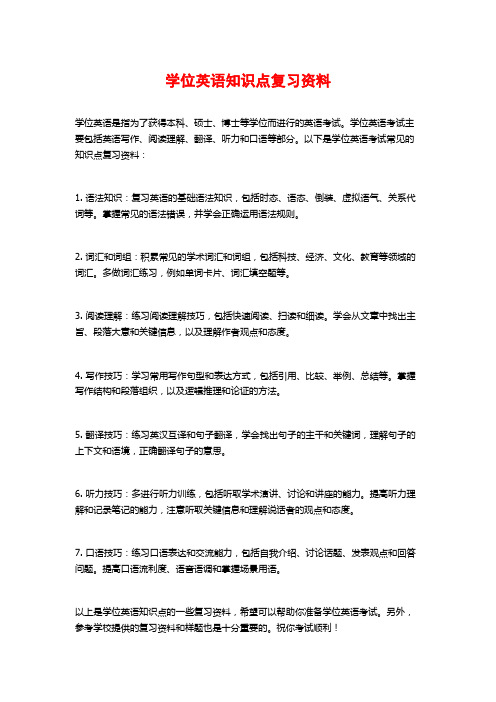
学位英语知识点复习资料
学位英语是指为了获得本科、硕士、博士等学位而进行的英语考试。
学位英语考试主要包括英语写作、阅读理解、翻译、听力和口语等部分。
以下是学位英语考试常见的知识点复习资料:
1. 语法知识:复习英语的基础语法知识,包括时态、语态、倒装、虚拟语气、关系代词等。
掌握常见的语法错误,并学会正确运用语法规则。
2. 词汇和词组:积累常见的学术词汇和词组,包括科技、经济、文化、教育等领域的词汇。
多做词汇练习,例如单词卡片、词汇填空题等。
3. 阅读理解:练习阅读理解技巧,包括快速阅读、扫读和细读。
学会从文章中找出主旨、段落大意和关键信息,以及理解作者观点和态度。
4. 写作技巧:学习常用写作句型和表达方式,包括引用、比较、举例、总结等。
掌握写作结构和段落组织,以及逻辑推理和论证的方法。
5. 翻译技巧:练习英汉互译和句子翻译,学会找出句子的主干和关键词,理解句子的上下文和语境,正确翻译句子的意思。
6. 听力技巧:多进行听力训练,包括听取学术演讲、讨论和讲座的能力。
提高听力理解和记录笔记的能力,注意听取关键信息和理解说话者的观点和态度。
7. 口语技巧:练习口语表达和交流能力,包括自我介绍、讨论话题、发表观点和回答问题。
提高口语流利度、语音语调和掌握场景用语。
以上是学位英语知识点的一些复习资料,希望可以帮助你准备学位英语考试。
另外,参考学校提供的复习资料和样题也是十分重要的。
祝你考试顺利!。
英语词汇学知识点整理
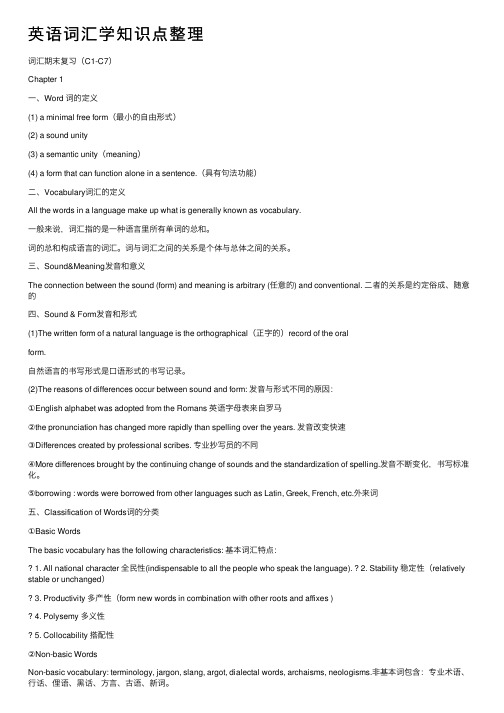
英语词汇学知识点整理词汇期末复习(C1-C7)Chapter 1⼀、Word 词的定义(1) a minimal free form(最⼩的⾃由形式)(2) a sound unity(3) a semantic unity(meaning)(4) a form that can function alone in a sentence.(具有句法功能)⼆、Vocabulary词汇的定义All the words in a language make up what is generally known as vocabulary.⼀般来说,词汇指的是⼀种语⾔⾥所有单词的总和。
词的总和构成语⾔的词汇。
词与词汇之间的关系是个体与总体之间的关系。
三、Sound&Meaning发⾳和意义The connection between the sound (form) and meaning is arbitrary (任意的) and conventional. ⼆者的关系是约定俗成、随意的四、Sound & Form发⾳和形式(1)The written form of a natural language is the orthographical(正字的)record of the oralform.⾃然语⾔的书写形式是⼝语形式的书写记录。
(2)The reasons of differences occur between sound and form: 发⾳与形式不同的原因:①English alphabet was adopted from the Romans 英语字母表来⾃罗马②the pronunciation has changed more rapidly than spelling over the years. 发⾳改变快速③Differences created by professional scribes. 专业抄写员的不同④More differences brought by the continuing change of sounds and the standardization of spelling.发⾳不断变化,书写标准化。
初中英语总复习知识点总结
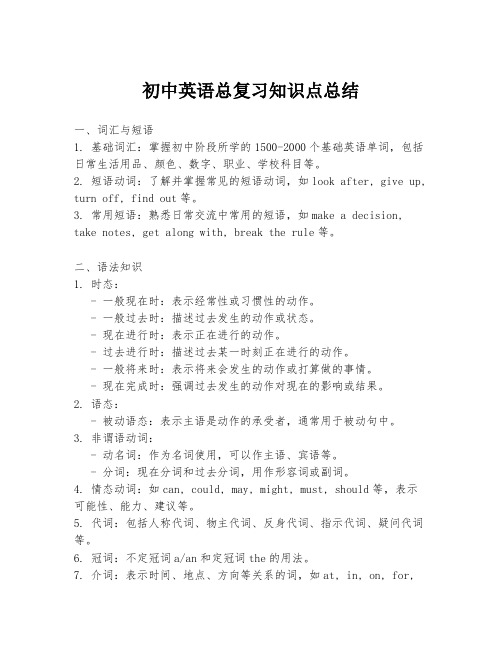
初中英语总复习知识点总结一、词汇与短语1. 基础词汇:掌握初中阶段所学的1500-2000个基础英语单词,包括日常生活用品、颜色、数字、职业、学校科目等。
2. 短语动词:了解并掌握常见的短语动词,如look after, give up, turn off, find out等。
3. 常用短语:熟悉日常交流中常用的短语,如make a decision, take notes, get along with, break the rule等。
二、语法知识1. 时态:- 一般现在时:表示经常性或习惯性的动作。
- 一般过去时:描述过去发生的动作或状态。
- 现在进行时:表示正在进行的动作。
- 过去进行时:描述过去某一时刻正在进行的动作。
- 一般将来时:表示将来会发生的动作或打算做的事情。
- 现在完成时:强调过去发生的动作对现在的影响或结果。
2. 语态:- 被动语态:表示主语是动作的承受者,通常用于被动句中。
3. 非谓语动词:- 动名词:作为名词使用,可以作主语、宾语等。
- 分词:现在分词和过去分词,用作形容词或副词。
4. 情态动词:如can, could, may, might, must, should等,表示可能性、能力、建议等。
5. 代词:包括人称代词、物主代词、反身代词、指示代词、疑问代词等。
6. 冠词:不定冠词a/an和定冠词the的用法。
7. 介词:表示时间、地点、方向等关系的词,如at, in, on, for,with等。
8. 连词:连接句子或句子成分的词,如and, but, or, because, although等。
三、句型结构1. 简单句:只有一个主谓结构的句子。
2. 并列句:用并列连词连接的两个或多个简单句。
3. 复合句:包含主句和从句的句子,从句可以是名词性从句、定语从句或状语从句。
- 名词性从句:包括主语从句、宾语从句、表语从句和同位语从句。
- 定语从句:修饰名词或代词的从句,通常由关系代词who, whom, whose, which, that等引导。
英语知识点归纳

英语知识点归纳随着全球化趋势的加强和英语教育的发展,高校英语教育的目标已经转变为培养学生的跨文化交际能力。
接下来店铺为你整理了英语知识点归纳,一起来看看吧。
英语知识点归纳(一)1. 动词be(is,am,are)的用法我(I)用am,你you用(are),is跟着他(he),她(she),他(it).单数名词用is,复数名词全用are。
变否定,更容易,be后not加上去。
变疑问,往前提,句末问号某丢弃。
还有一条须注意,句首大写莫忘记。
2. this,that和it用法(1)this和that是指示代词,it是人称代词。
(2)距离说话人近的人或者物用this,距离说话人远的人或物用that。
如:This is a flower.这是一朵花。
(近处)That is a tree.那是一棵树。
(远处)(3)放在一起的两样东西,先说this,后说that。
如:This is a pen.That is a pencil.这是一支钢笔,那是一支铅笔。
(4)向别人介绍某人说This is...,不说That is...。
如:This is Helen.Helen,this isTom.这是海伦,海伦,这是汤姆。
(5)This is不能缩写,而That is可以缩写。
如:This is a bike.That's a car.这是一辆自行车,那是一辆轿车。
(6) 打电话时,介绍自己用this,询问对方用that。
如:-Hello! Is that Miss Green?喂,是格林小姐吗?-Yes,this is.Who's that?是的,我是,你是谁?注意:虽然汉语中使用”我“和”你“,但英语中打电话时绝不可以说:I am...,Are you...?Who are you?(7)在回答this或that做主语的疑问句时,要用it代替this或者that。
如:①-Is this a notebook?这是笔记本吗?-Yes,it is.是的,它是。
初中英语所有知识点复习大全

初中英语知识归纳总结第一课时名词一、概述1、名词的属性:表示人或事物的名称抽象概念的词叫名词。
2、名词分普通名词和专有名词。
普通名词是表示某一类人或事物,或某种物体或抽象概念的名称。
如:teacher, desks, plates, milk, box等,专有名词表示某一特定的人、事物、地方团体、党派、国家机关、语言、节日等专用的名称。
(运用)如:China, Chinese, Saturday, June, Green, Beijing, Olympic等。
(专有名词的第一个字母要大写)二、可数名词与不可数名词1、可数名词是指表示人或事物,可以用数来计量的名词,有单复数之分。
如:glass-----glasses; book---- books2、不可数名词是指所表示的事物不能用数来计量。
如:paper, rice, water , milk, tea等。
3、有些名词在特定情况下由不可数变为可数名词。
Light travels faster than sound; (light:光线,不可数)The lights are on. (light:灯,可数)4、不可数名词的量的表示不可数名词一般无法用数来计算,前面不能用a或an或数词来表示数量,它的量往往借助于容器来表示。
如:a glass of milk ------ four glasses of milka piece of paper ------ two pieces of papera bag of rice ------ three bags of rice三、可数名词的复数形式(识记、运用)1、可数名词在应用时有单复数之分,单数变复数有规则变化和不规则变化两种。
规则变化2、少数名词有不规则的变化形式policeman---policemen; man---men; woman---women;tooth---teeth; foot---feet; sheep---sheep; deer---deer;Japanese--- Japanese; Chinese --- Chinese; fish --- fish四、名词所有格(运用)名词的所有格是表示所有关系的形式,它也有构成上的变化。
(完整版)学位英语知识点

第一部分:重点词汇1. put down 放下shut down 把…关上cut down 砍掉come down 下来、落下slow down 减缓、放慢sit down 坐下write down 写下get down 下来,降落2. after all 毕竟.终究after that 于是.然后day after day 日复一日地one after another 相继.挨次soon after 不久以后the day after tomorrow 后天3. come up with 找到、提出catch up with 赶上wake up 弄醒、醒来send up 发射open up 开设、开办grow up 长大pick up 拾起、捡起hands up 举手eat up 吃光clean up 打扫干净give up doing sth.=stop doing sth. 放弃做某事4. arrive at/in + n. 到达get to +n. 到达reach + n. 到达arrive / get +adv. 到达5. get…back 退还,送回去.取回give back 归还come back 回来at the back of 在…的后面on the way (back)home 在回家路上6. at least 至少at breakfast 早餐时at desk 在桌前at once立刻,马上at school 在上学at the same time 同时at work 在工作be good at=do well in 擅长laugh at 嘲笑not…at all 一点也不at first 起初at night 在晚上at noon 中午at the a ge of // when sb. was…years old 在…岁时at last / in the end / finally 最后、终于at the beginning of the twenty-first century 在21世纪初at the end of 在…终点、结尾at the moment // now现在at the foot of 在…脚下at Christmas 在圣诞节at any moment 任何时候at times(sometimes) 有时,偶尔at the d octor’s 在医务室be bad at不擅长7. for example 例如for ever 永远be good for 对…有益be bad for 对…有害for long=for a long time 长期for short 简称be short for 是…的简称TV is short for “television”8. come true 实现come down 下来come from=be from 来自,出生于come in/into 进入,进来come on 赶快come over 过来come along 走吧,过来,快点come and go 来来去去come up 上来come out 出来,(花)开,(照片)冲洗出来9. even though=even if 即使、虽然、尽管10. be pleased with 对…感到满意be covered with 被…覆盖be busy with忙于做某事Be filled with 装满be satisfied with 对….满意deal with sth. 应对、处理finish with完成某事be expected to do sth. 被期望做某事well done 干得好11.be proud of 以…自豪speak highly of 称赞be afraid of 害怕hear of 听说(hear from sb.收到某人的来信)of course=certainly 当然可以plenty of= a lot of 许多11. by the way 顺便说by oneself 单独,独自by the end of 到…为至by the time (引起时间状语从句)到…的时候one by one 依次by air / plane 乘飞机by bus / train / car 乘公共汽车/火车/轿车catch a bus 赶公交车get on / off the bus上/下车take a bus to…=go to …by bus乘车去12. do / try one’s best 尽力do one’s homework 做家庭作业do (the/some) shopping 购物do the cooking 烹饪do some cleaning 打扫do the / some washing 洗衣服do sport 做运动13. early in the morning 一大早in the early spring 初春in my early days 我幼年时期14. make a contribution to 贡献给、捐献make a telephone call to sb. // ring sb. up // give sb. a call // phone sb.给某人打电话connect…to…把…与…连接起来be close to 靠近(某地)give birth to 生(孩子)lose to sb 输给sb .15. either…or… 或者…或者…on either side of the street 街道任何一边on each side of the street 街道每一边on both sides of the street 街道两边16. keep doing sth. 不停地做某事(表示状态继续)keep on doing sth. 坚持做某事(表示动作反复进行) practise doing sth. 练习做某事enjoy doing sth. 喜欢做某事finish doing sth. 做完某事go on doing sth. 继续做某事(同一件事)17. go on to do sth. 接着做某事(另一事)go straight along 沿着…一直往前走go down 下降go for a walk 散步go over 复习go shopping 买东西go to the cinema 去看电影go well 进展顺利go off to 动身前往go out 外出go to work 去上班go up 上升18. think about 考虑think of 认为、想起、考虑、想到think over 仔细考虑think out 想出talk about 谈论worry about 担心How / What about…?…怎么样?19. borrow…from … 从…借…lend…to… 把…借给…from door to door 挨家挨户from time to time 时时from now on 从今以后from then on 从那以后be different from 与…不同learn…from… 向…学习20. get dressed 穿衣get into 进入get / be lost 丢失get off / on下/ 上车get on well with sb. 与某人相处得好get out of 从…出来get ready for +n. 为…做准备get ready to do sth. 准备做某事get / go to sleep (fall asleep) 入睡be asleep 睡着get warm 变暧get well 康复get a chance 有机会、得到机会21. look for 寻找wait for 等候look after=take care of 照看look like 看起来像look over 检查,复习look out 小心,从里向外看look the same 看起来一样look up 向上看,查单词look around 环视look forward to 期望look through 温习,检查22. set off 出发、动身put off 推迟keep off 避开、不靠近…drop off 放下(某物)turn off 关jump off 跳离take off 脱(衣),(飞机)起飞23. half a kilo 半千克half an hour 半小时in half 分成两半half of the day 半天24. do eye exercises 做眼保健操do morning exercises 做早操take (more) exercise (多)参加体育锻炼an exercise book 练习本25. take part in 参加hand in 上交in hospital 住院in surprise 吃惊地in the sun 在阳光下in trouble 处于困境in a minute / moment马上26. leave for… 动身去某地27. feed on 以…为主食live on 继续活着base on 以…为根据carry on 坚持、继续下去and so on 等等on the other hand 另一方面on foot 步行28. be famous for 以..著名be excited about +n./V-ing 对…感到兴奋be interested in 对…感兴趣be born 出生be busy with sth.=be busy doing sth. 忙于…be amazed at 对..感到惊讶29. move away 移开move to (搬)移到30. search the Internet 上网31. make sure 确信make a dialogue 编对话make a mistake 犯错误by mistake 由于疏忽make a noise 吵闹make faces 做鬼脸make friends (with) 和..交朋友make room for 给..让地方make tea 沏茶make money 赚钱make a decision 作出决定32. used to do sth 过去常常做某事be used to doing sth. 习惯于做某事33. leave sth+介词短语“把……忘记在某处”34. forget to do sth. 忘记做某事encourage sb. to do sth. 鼓励某人做某事decide to do sth. 决定做某事allow sb. to do sth. 允许某人做某事35. hear sb. to do (doing)sth. 听见某人做某事36. help sb. (to) do sth .//help sb. with sth. 帮助某人做某事with one’s help 在某人的帮助下with pleasure 乐意37. the summer holiday(s)vocation 暑假the winter holiday(s)/vocation 寒假38. step into 走进pour into 倒入…put….into 翻译成divide into分成translate into翻译成39. in the first 第一for the first time 第一次at first 起初a firs t language 母语first of all 首先40. leave a message for sb. 给某人留条give / take sb. a message 给某人捎口信41. take photos / pictures 照像take away 拿走take out 取出work out 算出take care 当心take medicine 服药take one’s temperature 量体温take one’s time 别着急take a walk 散步take place 发生42. learn by oneself / teach oneself 自学learn by heart 背熟43. a year and a half (one and a half years ) 一年半44. have a try 尝试,努力try out 尝试、试验find out 找出,查明have a good / wonderful / great / time 玩得开心have a (bad) cold (重)感冒have a meeting / walk / watch 开会/散步/比赛have sports 进行体育活动have nothing / sth. to do with 与..无(有)关have no idea 不知道have (one’s) medicine 服药45. offer sb sth. 给某人提供某物46. win first prize 获一等奖47. all over the world= around the world =throughout the world 全世界48. all kinds of 各种各样的49. neither… nor 既不…也不….50. not only … but also … 不但…而且both… and ……和…都51. the more , the better 越多越好52. all one’s life 一生53. as soon as 一…就…as soon as possible 尽可能早地、尽快as well = too也as much as 至多as little as 至少regard …as 把…当作…as if 好像54. no matter 无论…55 ever since 从那以后,此后一直56. so far 到目前为止or so大约57. another two hours (=two more hours ) 又(再) 2个小时58. three times a week 一周三次59. the number of… 的数量a (large / good) number of / large numbers of / many 许多60. less than少于, less and less 越来越少61. …is another way of saying… 什么是..的另一说法Quick is another way of saying fast. Bike is short for bicycle.62. not…until… 直到…才…63. be like 像feel like +n./V-ing 想要like best 最喜欢, would like to 想要64. the 24 hour clock 24 小时制65. wash away 冲走run away 逃跑take away 带走66. before long 不久long before / ago 很久以前for long =for a long time 长期no longer = not. .any longer 不再67. more or less = about 或多或少,大约more than = over 多于,超过68. every year 每年every four years 每隔四年every other day 每隔一天everyday English / life 日常英语/生活69. next to 紧挨着next door 隔壁,邻居next year 明年next time 下次70. receive / get / have a letter from sb. = hear from sb 收到某人的来信71. on show = on display 展览72.be filled with / be full of 充满…73. thank to =because of 由于74. some day =one day (将来)某一天all day 终日day and night 日日夜夜in a day or two 一两天内in the old days 从前,旧社会from day to day (day after day) 日复一日the day before yesterday 前天the day after tomorrow 后天Tree Planting Day 植树节Women’s Day 妇女节75. keep / stop / prevent… (from) doing sth. 防止(阻止)…做某事stop to do sth. 停下来去做某事stop doing sth. 停止做某事76. nice and +adj. = very +adj. 很,非常77. a place (places) of interest 名胜78. three quarters of the information on the Internet 因特网上四分之三的信息two thirds of the books 三分之二的书79. credit card 信用卡80. the increasing population 增长着的人口81. a path of travel 旅行路线82. point at / to 指向83. by sea = by ship 乘船by the sea = on the sea 在海边at sea在海上84. set one’s mind to do sth. 一心想做某事85. multiply…by… 乘以…86. See you! 再见You see. 你知道,你明白,你瞧Let me see. 让我想想see sb. off 给某人送行see a / the doctor 看病see sb . do / doing sth. 看见某人做某事87. some…others 一些(人,物)…其他(人,物)one…another 一个..另一个(三者或以上)one…the other 一个…另一个(总数二个) each other彼此88. be worn out 穿旧,磨坏check out 核实,检查write out 写出take sth. out of 从…拿出/取出某物89. in this way 用这种方法in a few year’s time 几年以后in space 在太空in and out of class 在课内课外in the last fifteen minutes 在最后十五分钟里in the second half 在下半场later in one’s life 在某人后半身in the air 在空中in the open air 在户外90. give sb. an injection给某人打针, get an injection打针91. have been to 去过某地have gone to 到某地去了92. here + be+ 名词+ for+某人( Here is a letter for you. 这儿有你的一封信.)93. be far behind +某人(He is far behind others. 他落后于别人)94. one of + adj. 最高级+复数名词95. take +某物+with +某人(You’d better take an umbrella with you. 你最好带上雨伞)96. prefer to= like…better than 宁愿,更喜欢prefer + V-ing (to do sth.) ( I prefer doing (to do) it myself .我喜欢自己做那件事).Would / should 等情态动词+ prefer +不定式. (I would prefer to do it myself.我宁愿自己做那件事)prefer +名词(v-ing) + to+名词(v-ing) (I prefer learning English to playing football.我愿意学英语而不愿踢足球) prefer +不定式(名词)+ rather than + 不带to的不定式,(I prefer to walk there rather than go by bus.我喜欢走着去那里, 而不愿乘车)prefer + 名词(代词) to do sth. (We prefer her not to come.我们宁愿她不来)97. 人+ spend +time (money) +(in) doing sth. (I spent over two hours (in) finishing my homework.我花了两个多小时完成家庭作业.)人+ spend + time (money) + on +名词, (He spent 1,000 on the TV set .他花了一千元买电视机)人+ pay + money +for +sth. ( He paid ten yuan for the book .他花了10元钱买那本书.)It + takes (will take, / took…) + sb. + time (money) + to do sth. (It’ll take you only ten minutes to get there bybus.乘车去那里只花你10分钟)物sth+ cost + (sb.) + money, (The dictionary cost me 20 yuan .我花20元钱买了那本词典)98. do with + sb. / sth. (What have you done with the pork ? 那些肉你怎么处理了?)99. mind + if 从句, (Do you mind if I open the window?我开窗你不反对吧?)mind + V-ing, (Would you mind turning on the TV?打开电视你不反对吧?)100. what…for? / why…? (What do you learn English for? = Why do you learn Englis h?)101. need + 名词(v-ing), (The students need some help.学生们需要帮助.This pair of shoes needs mending.这双鞋需要修理)102. “be used for+ 名词(v-ing),”被用来做.. (A writing brush is used for writing.)“be used as+名词”, 被作为…使用(English is used as the first language in none of these countries. )“be used by+动作执行者”, 被…使用,103. be made of 由…制造(This table is made of wood .这张课桌是木制的)be made from由…制成(This kind of paper is made from wood . 这种纸是用木材制成的)be made in+地点, “某地制造”(These cars are made in Germany) be made by+人, “由谁制造的” (Th is kite is made byKate . )104. more developed countries发达国家, less developed countries不发达国家,developing countries发展中国家105. be worth + money (V-ing),值…钱.值得做…This car is worth more than two million yuan in China. This book is well worth reading.worth reading.这本书很值得一读.106. the Summer Palace 颐和园Tian’anmen Square 天安门广场the Palace Museum 故宫the Great Hall of the People 人民大会堂the Temple of Heaven天坛the Great Green Wall 绿色长城PekingOpera 京剧PLA 中国人民解放军PRC 中华人民共和国the Party 中国共产党the League 共青团The Forbidden City紫禁城军事博物馆the Military Museum the Palace Museum故宫107. a digital camera 数字照相机a doctor for animals = an animal doctor 动物医生108. so + 形/副+that 从句(The place is so cold that nothing can grow in winter .这地方太冷,冬天什么都不长)so + many / few+ 复数名词+that从句(He has so many books that I don’t know which one to borrow. 他有那么多书,我不知道借哪一本)so + much / little+ 不可数名词+that从句(She has so little money that she can’t buy anything .她钱太少,什么也买不到.)so+ 形容词+a / an +单数名词+that从句(This is so good a book that all of us like reading it )such +a / an+ 形容词+单数名词+ at从句(This is such an interesting story that all of us like it)such +形容词+复数名词+that从句. such +形容词+不可数名词+that从句(It is such fine weather today that many childrenare playing outside)109. tell sb about sth.告诉某人关于某事, tell sb+从句, tell sb. to do sth.让某人做某事tell a lie说谎, tell a story讲故事, thank you for +n ./V-ing 谢谢你… too + adj. / adv. + to + v.太…而不能, toomuch(修饰名词)太多,过分, much too(修饰adj./adv.)太110. hope / wish+不定式(或从句), wish sb. to do sth. What do you mean by…?= What does… mean?…是什么意思?一、接不定式(而不接动名词)作宾语的24个常用动词afford to do sth. 负担得起做某事agree to do sth. 同意做某事arrange to do sth.安排做某事ask to do sth. 要求做某事beg to do sth. 请求做某事care to do sth. 想要做某事choose to do sth. 决定做某事decide to do sth. 决定做某事demand to do sth. 要求做某事determine to do sth. 决心做某事expect to do sth. 期待做某事fear to do sth. 害怕做某事help to do sth. 帮助做某事hope to do sth. 希望做某事learn to do sth. 学习做某事manage to do sth. 设法做某事offer to do sth. 主动提出做某事plan to do sth. 计划做某事prepare to do sth. 准备做某事pretend to do sth. 假装做某事promise to do sth. 答应做某事refuse to do sth. 拒绝做某事want to do sth. 想要做某事wish to do sth. 希望做某事注:有些不及物动词后习惯上也接不定式,不接动名词:aim to do sth. 打算做某事fail to do sth. 未能做某事long to do sth. 渴望做某事happen to do sth. 碰巧做某事hesitate to do sth. 犹豫做某事struggle to do sth. 努力做某事二、接不定式作宾补的36个常用动词advise sb. to do sth. 建议某人做某事allow sb. to do sth. 允许某人做某事ask sb. to do sth.请(叫)某人做某事bear sb. to do sth.忍受某人做某事beg sb. to do sth. 请求某人做某事cause sb. to do sth. 导致某人做某事command sb. to do sth. 命令某人做某事drive sb. to do sth .驱使某人做某事elect sb. to do sth. 选举某人做某事encourage sb. to do sth. 鼓励某人做某事expect sb. to do sth. 期望某人做某事forbid sb. to do sth. 禁止某人做某事force sb. to do sth. 强迫某人做某事get sb. to do sth. 使(要)某人做某事hate sb. to do sth. 讨厌某人做某事help sb. to do sth. 帮助某人做某事intend sb. to do sth. 打算要某人做某事invite sb. to do sth. 邀请某人做某事leave sb. to do sth. 留下某人做某事like sb. to do sth. 喜欢某人做某事mean sb. to do sth. 打算要某人做某事need sb. to do sth. 需要某人做某事oblige sb. to do sth. 迫使某人做某事order sb. to do sth. 命令某人做某事permit sb. to do sth. 允许某人做某事persuade sb. to do sth. 说服某人做某事prefer sb. to do sth. 宁愿某人做某事request sb. to do sth. 要求某人做某事remind sb. to do sth. 提醒某人做某事teach sb. to do sth .教某人做某事tell sb. to do sth. 告诉某人做某事train sb. to do sth. 训练某人做某事trouble sb. to do sth. 麻烦某人做某事want sb. to do sth. 想要某人做某事warn sb. to do sth. 警告某人做某事wish sb. to do sth. 希望某人做某事注:不要受汉语意思的影响而误用以下动词句型:汉语说:“害怕某人做某事”,但英语不说fear sb. to do sth.。
英语知识点总复习(集合6篇)

英语知识点总复习(集合6篇)英语知识点总复习第1篇【语法】特殊疑问句基本规律一般问句语序﹙疑问词﹙组﹚不作主语﹚一般问句语序﹙疑问词﹙组﹚不作主语﹚特殊问句=疑问词﹙组﹚﹢谓语……﹙疑问词﹙组﹚作主语﹚常用句型1)询问职业、身份What is your father? He is a2)询问姓名、关系Who is that boy? He is my brother3)询问相貌特征 4)询问目的What is she like?=What does she look like? What did they come here for?She is To attend a5)询问原因 6)询问天气Why did they come here? How is the weather today?Because they have a meeting to = What is the weather like today?7)询问颜色 8)询问尺寸What dolor is her skirt? What size does he wear?It’s He wars9)询问钟点 10)询问星期What time is it? What day is it today?It’s It’s11)询问几号 12)询问年龄What is the date today? How old is he?It’s May He is13)询问多久 14)询问长度How long have you been here? How long is the bridge?For five It’s 50015)询问距离 16)询问频度How far is it from here to the zoo? How often do you come back? It’s 6 Once a17)询问多快 18)询问数量How soon will she arrive? How many jackets do you have?In an How much coffee do you want?19)询问价格 20)询问高度How much is it? How tall is she?How much does it cost? How high is the tower?二.难点讲评’s your favorite subject?你最喜欢的学科是什么?释:1)favorite是形容词“最喜欢的”,作定语或表语。
英语知识点复习资料

英语知识点复习资料英语知识点复习资料英语作为一门全球通用的语言,对于许多人来说是必备的技能。
然而,由于学习英语的过程中需要掌握大量的词汇和语法规则,很多人往往会感到困惑和挫败。
为了帮助大家更好地复习英语知识点,本文将为大家提供一些有关英语知识点的复习资料。
一、词汇复习1. 同义词和反义词:在学习英语的过程中,掌握一些常见的同义词和反义词是非常重要的。
这不仅可以帮助我们扩展词汇量,还可以提高我们的表达能力。
例如,"happy"的同义词可以是"joyful",反义词可以是"sad"。
2. 词根和词缀:了解一些常见的词根和词缀可以帮助我们更好地理解词汇的构成和含义。
例如,"tele-"表示远程,"-logy"表示学科。
通过学习这些词根和词缀,我们可以更轻松地理解和记忆新的词汇。
二、语法复习1. 时态和语态:时态和语态是英语语法中的重要部分。
掌握各种时态和语态的用法可以帮助我们准确地表达过去、现在和将来的动作。
例如,一般现在时用于描述经常发生的动作,而过去完成时用于描述在过去某个时间点之前已经完成的动作。
2. 句子结构:了解不同类型的句子结构可以帮助我们更好地理解和构建句子。
例如,简单句由一个主语和一个谓语构成,而复合句由一个主句和一个或多个从句构成。
通过学习句子结构,我们可以更清晰地表达自己的意思。
三、阅读理解1. 主旨大意:在阅读理解中,抓住文章的主旨大意是非常重要的。
通过理解文章的中心思想,我们可以更好地理解文章的细节和观点。
为了提高对主旨大意的把握能力,我们可以多读一些不同类型的文章,并尝试用自己的话总结文章的主要内容。
2. 推理判断:在阅读理解中,推理判断是我们理解文章意义的关键。
通过根据文章中的线索进行推理,我们可以推断出作者的观点、意图和态度。
为了提高推理判断的能力,我们可以多做一些练习题,并学会从不同角度思考问题。
英语知识点复习教案七篇
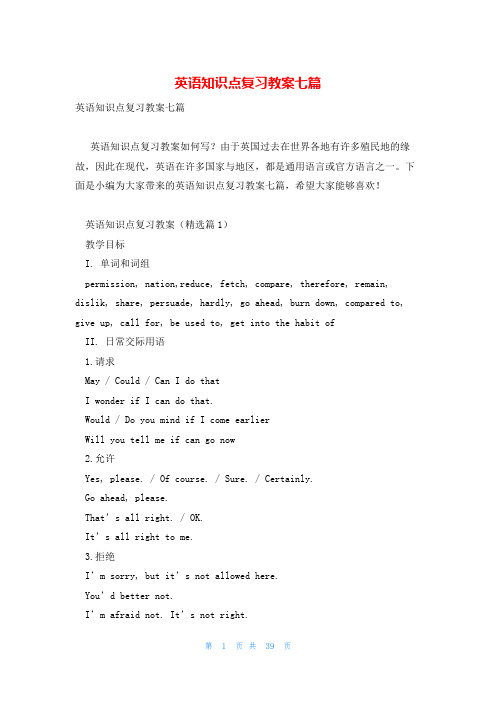
英语知识点复习教案七篇英语知识点复习教案七篇英语知识点复习教案如何写?由于英国过去在世界各地有许多殖民地的缘故,因此在现代,英语在许多国家与地区,都是通用语言或官方语言之一。
下面是小编为大家带来的英语知识点复习教案七篇,希望大家能够喜欢!英语知识点复习教案(精选篇1)教学目标I. 单词和词组permission, nation,reduce, fetch, compare, therefore, remain, dislik, share, persuade, hardly, go ahead, burn down, compared to, give up, call for, be used to, get into the habit ofII. 日常交际用语1.请求May / Could / Can I do thatI wonder if I can do that.Would / Do you mind if I come earlierWill you tell me if can go now2.允许Yes, please. / Of course. / Sure. / Certainly.Go ahead, please.That’s all right. / OK.It’s all right to me.3.拒绝I’m sorry, but it’s not allo wed here.You’d better not.I’m afraid not. It’s not right.III.语法复习名词性从句作宾语和表语的用法。
教学建议教材分析The main dialogue of this unit is to practise the students how to ask for permission, refuse and give permission ability. Though learning the way of expressing are able to remind the students speaking in daily life. This dialogue is the main idea to learn to use these phrase for permission. Though two men’s talking. Meanwhile this lesson offer some practice to help the students to understand and learn about the content of the dialogue. In order to master these phases, this lesson has short dialogue to give the students to speak each other.重点词汇讲解1.catch fire与be on fire1)catch fire:begin to burn着火;烧着。
中考英语知识点复习
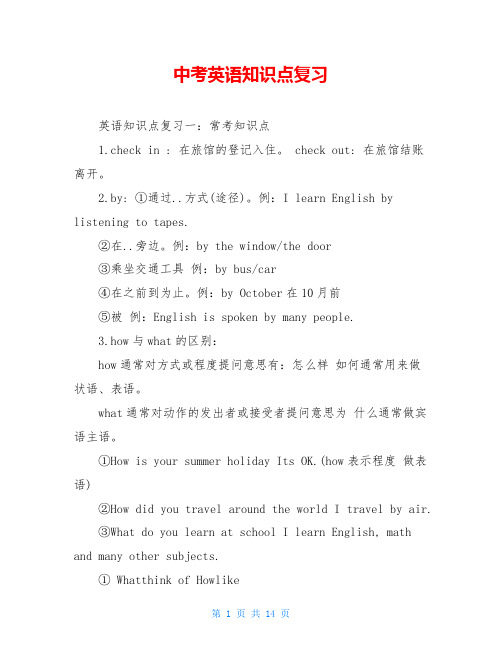
中考英语知识点复习英语知识点复习一:常考知识点1.check in : 在旅馆的登记入住。
check out: 在旅馆结账离开。
2.by: ①通过..方式(途径)。
例:I learn English by listening to tapes.②在..旁边。
例:by the window/the door③乘坐交通工具例:by bus/car④在之前到为止。
例:by October在10月前⑤被例:English is spoken by many people.3.how与what的区别:how通常对方式或程度提问意思有:怎么样如何通常用来做状语、表语。
what通常对动作的发出者或接受者提问意思为什么通常做宾语主语。
①How is your summer holiday Its OK.(how表示程度做表语)②How did you travel around the world I travel by air.③What do you learn at school I learn English, math and many other subjects.① W hatthink of Howlike② Whatdo with Howdeal with③ Whatlike about Howlike④ Whats the weather like today Hows the weather today⑤ What to do How to do ite.g. What do you think of this book=How do you like this bookI dont know what I should do with the matter.=I dont know how I should deal with it.What do you like about China=How do you like ChinaI dont know what to do ne_t step=I dont know how to do it ne_t step㊣ What good / bad weather it is today!(weather为不可数名词其前不能加 a )㊣ What a fine / bad day it is today! (day为可数名词其前要加 a )4. aloud, loud与loudly的用法:三个词都与大声或响亮有关。
英语 各种知识点

英语各种知识点共20个1. 词汇(Vocabulary):学习和掌握单词,包括常用词汇和专业词汇。
2. 语法(Grammar):了解句子结构、时态、语态等语法规则。
3. 发音(Pronunciation):正确发音英语单词和短语,注意语音语调。
4. 听力(Listening):培养听力技能,理解不同口音和语速的英语。
5. 口语(Speaking):流利、自然地表达自己,练习口头交流能力。
6. 阅读(Reading):理解各种文本,包括文章、小说、报纸等。
7. 写作(Writing):提高写作技能,包括句子结构、篇章组织等。
8. 单词拼写(Spelling):正确拼写单词,注意常见拼写规则。
9. 常用短语和习惯用语(Idioms and Phrases):理解和运用常用的习惯用语和短语。
10. 修辞手法(Figures of Speech):了解和运用修辞手法,如比喻、拟人等。
11. 文学知识(Literary Knowledge):熟悉一些经典文学作品和文学流派。
12. 诗歌(Poetry):理解和欣赏诗歌的结构和表达方式。
13. 写作风格(Writing Style):培养个人写作风格,适应不同写作任务的风格要求。
14. 交际技能(Communication Skills):学会在不同情境下进行有效的交流。
15. 文化背景(Cultural Background):了解英语国家的文化、传统和社会习惯。
16. 多媒体素材的理解(Media Literacy):理解和分析视频、音频等多媒体素材。
17. 学术写作(Academic Writing):掌握学术写作的规范和技巧。
18. 批判性思维(Critical Thinking):培养对文本的批判性思考和分析能力。
19. 行业术语和专业词汇(Industry Terminology):根据自己的专业领域学习相关的行业术语。
20. 考试技巧(Exam Skills):掌握在英语考试中常用的策略和技巧,如阅读理解、写作技巧等。
英语语法知识点归纳

英语语法知识点归纳英语语法知识点归纳 1第一点:动词的变化1、代词及be动词主格 I we you you she/he/it they宾格 me us you you her/him/it them代词所有格 my our your your her/his/its their名词性代词 mine ours yours yours hers/his/its theirsbe动词现在时 Am are are are is arebe动词过去时 was were were were was were2、名词的复数规则变化的名词复数形式规则1 一般情况+s e.g. shell→shells toy→toys规则2 以s, x, ch, sh结尾+es e.g. fox→foxes church→churches规则3 以o结尾+s或+es e.g. radio→radios potato→potatoes规则4 以f, fe结尾的,变f, fe为ves e.g.life→lives half→halves规则5 以辅音字母+y结尾,变y为i+es e.g.sky→skies study→studies3、动词的第三人称单数形式规则1 一般情况+s e.g. like-likes, look-looks规则2 以s, x, ch, sh和o结尾+es e.g. do-does, catch-catches规则3 以辅音字母+y结尾,变y为i+es e.g. carry-carries, fly-flies4、动词现在分词规则1 一般动词加-ing e.g. look-looking, read-reading, play-playing规则2 以不发音的字母结尾的单词去e加-ing e.g. make-making, take-taking, arrive-arriving规则3 重读闭音节词结尾,即单词中只有一个元音字母,其后紧跟一个辅音字母的词,双写辅音字母再加-ing e.g. run-running, sit-sitting, get-getting, swim-swimming, stop-stopping5、动词过去式规则动词变化规则1 一般动词加-ed e.g. look-looked, watch-watched, play-played.规则2 以e结尾的加-d e.g. make-maked, arrive-arrived.规则3 以辅音字母y结尾的变y为i加-ed cry-cried, carry-carried.规则4 重读闭音节词结尾,即单词中只有一个元音字母,其后紧跟一个辅音字母的词,双写辅音字母再加-ed stop-stopped过去式的读音在清辅音后面(除外)读/t/ e.g. walked, jumped在浊辅音和元音后读/d/ e.g. washed, watched在/t/,/d/后读/id/ e.g. waited, hated6、形容词和副词的比较级和最高级比较级规则1 一般加-er e.g. high-higher规则2 以e结尾加-r nice-nicer规则3 以辅音字母加y结尾,变y为i再加-er busy-busier规则4 重读闭音节结尾,双写辅音字母再加-er fat-fatter最高级规则1 一般加-est e.g. high-highest规则2 以e结尾加-st nice-nicest规则3 以辅音字母加y结尾,变y为i再加-est busy-busiest规则4 重读闭音节结尾,双写辅音字母再加--est fat-fattest7、常见缩写:is='s I am=I'm are='reis not=isn't /iznt/ are not=aren't /a:nt/do not=don'tdoes not=doesn'twas='sdid not=didn'tcan not=can'thave='vehas='shave not=haven'thas not=hasn'twill='llwill not=won'tshall not=shan't第二点:将来完成进行时将来完成进行时形式will/shall have been+现在分词用于第一人称,而 will have been+现在分词用于其他人称。
初中英语知识点(复习资料完整版)

初一年级(上)【知识梳理】I. 重点短语1. Sit down 坐下2. on duty 值班3. in English 用英语4. have a seat 有座位5. at home 在家6. look like 看上去像7. look at 看8. have a look 与look at同义,看9. come on 加油;得了吧;快点10. at work 工作11. at school 上学12. put on 穿上13. look after 照顾14. get up 起床15. go shopping 购物II. 重要句型1. help sb. do sth. 帮助某人做某事2. What about…? 建议,做。
怎么样what about doing sth ?=how about doing sth ?=why not do sth ?3. Let‟s do sth. 让我们做某事4. It‟s time to do sth. 是做某事的时候了it is time for sb to do sth =it is time that sb did sth=it is time that sb should do sth5. It‟s time for 是做什么的时候了…6. What‟s…? It is…/ It‟s… 是什么?它是7. Where is…? It‟s….在哪儿?在。
8. How old are you? I‟m…你多大了?.9. What class are you in? I‟m in….你在哪个班10. Welcome to…. 欢迎来到(welcome to our school 欢迎来到我们的学校)11. What‟s …plus…? It‟s…. 几加几时多少?what is 5 plus 8?it is 13.12. I think… 我认为13. Who‟s this? This is…. 那是谁14. What can you see?I can see….你可以看到什么15. There is (are) …. 有。
初中英语总复习知识点归纳(基本全了)
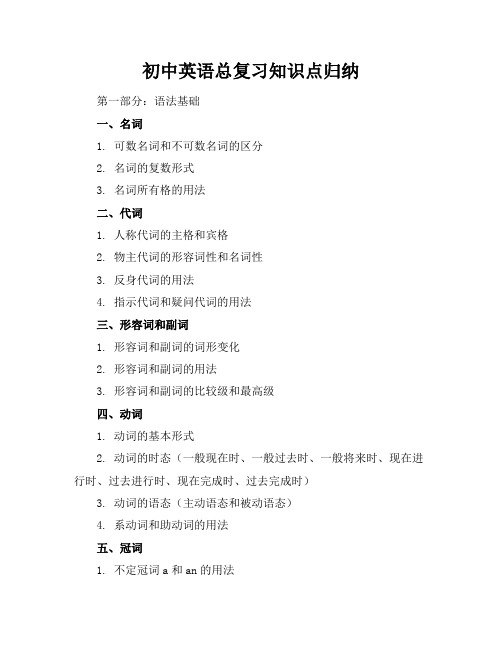
初中英语总复习知识点归纳第一部分:语法基础一、名词1. 可数名词和不可数名词的区分2. 名词的复数形式3. 名词所有格的用法二、代词1. 人称代词的主格和宾格2. 物主代词的形容词性和名词性3. 反身代词的用法4. 指示代词和疑问代词的用法三、形容词和副词1. 形容词和副词的词形变化2. 形容词和副词的用法3. 形容词和副词的比较级和最高级四、动词1. 动词的基本形式2. 动词的时态(一般现在时、一般过去时、一般将来时、现在进行时、过去进行时、现在完成时、过去完成时)3. 动词的语态(主动语态和被动语态)4. 系动词和助动词的用法五、冠词1. 不定冠词a和an的用法2. 定冠词the的用法3. 不使用冠词的情况六、连词1. 并列连词的用法2. 从属连词的用法七、介词1. 常用介词的用法2. 介词短语的结构和用法八、数词1. 基数词和序数词的用法2. 分数、小数和百分数的表达九、感叹词1. 感叹词的用法十、疑问词1. 疑问词的用法十一、句型结构1. 简单句的五种基本句型2. 并列句和复合句的结构和用法十二、主谓一致1. 主谓一致的原则2. 主谓一致的特殊情况十三、倒装句1. 完全倒装和部分倒装的区别2. 常见的倒装句型十四、省略句1. 省略句的结构和用法十五、强调句1. 强调句的结构和用法十六、虚拟语气1. 虚拟语气的用法十七、情态动词1. 情态动词的用法十八、非谓语动词1. 非谓语动词的分类和用法十九、固定搭配1. 常见的固定搭配二十、习惯用语和俚语1. 常见的习惯用语和俚语第二部分:词汇与短语一、词汇记忆方法1. 词根词缀记忆法2. 同义词和反义词记忆法3. 分类记忆法4. 联想记忆法二、常见词汇和短语1. 常用动词短语2. 常用形容词短语3. 常用介词短语4. 常用连词短语5. 常用固定搭配三、词汇辨析1. 形近词辨析2. 意思相近的词辨析3. 语境辨析四、词汇应用1. 词汇在句子中的应用2. 词汇在段落中的应用3. 词汇在文章中的应用五、词汇扩展1. 通过阅读扩展词汇2. 通过听力扩展词汇3. 通过口语和写作扩展词汇六、词汇复习策略1. 制定词汇复习计划2. 定期进行词汇测试3. 反复记忆和复习第三部分:阅读理解一、阅读技巧1. 快速阅读2. 精读3. 猜词技巧4. 理解文章主旨和大意5. 找出文章中的细节信息二、阅读题型1. 主旨大意题2. 细节理解题3. 推理判断题4. 词义猜测题5. 观点态度题三、阅读材料1. 故事类文章2. 议论文3. 说明文4. 应用文5. 新闻报道四、阅读理解策略1. 预览文章和首段2. 扫读文章找出关键词3. 仔细阅读理解文章内容4. 回答问题时注意关键词和语境5. 验证答案是否符合文章内容第四部分:写作技能一、写作技巧1. 确定写作目的和主题2. 拟定写作提纲3. 运用适当的句型和词汇4. 保持文章逻辑清晰5. 注意文章格式和标点符号二、写作题型1. 记叙文2. 议论文3. 说明文4. 应用文5. 日记和书信三、写作素材1. 人物描写2. 地点描写3. 事件描写4. 情感表达5. 观点陈述四、写作策略1. 多读优秀范文2. 多练习写作3. 请教老师和同学4. 反复修改和润色5. 保持写作兴趣和热情第五部分:听力理解一、听力技巧1. 预测听力内容2. 抓住关键词和关键信息4. 边听边记笔记5. 理解对话和独白的逻辑关系二、听力题型1. 简单听力理解题2. 听力细节理解题3. 听力推理判断题4. 听力主旨大意题5. 听力词义猜测题三、听力材料1. 对话2. 独白3. 新闻报道4. 广播节目5. 电影和电视剧片段四、听力理解策略1. 预览问题和选项2. 仔细听录音,注意关键词3. 根据听力内容进行推理和判断4. 选择最符合听力内容的答案5. 检查答案是否符合题意第六部分:口语表达一、口语技巧1. 准备话题和内容3. 保持语速适中4. 注意语法和词汇的准确性5. 保持自信和流畅二、口语题型1. 自我介绍2. 话题讨论3. 角色扮演4. 观点陈述5. 回答问题三、口语素材1. 日常生活话题2. 学校生活话题3. 社会热点话题4. 个人兴趣爱好话题5. 旅游和文化话题四、口语表达策略1. 多听多说,提高口语能力2. 模仿优秀的口语表达3. 与老师和同学进行口语练习4. 参加英语角和口语比赛5. 记录自己的口语表达,进行反思和改进第七部分:综合技能一、综合技巧1. 综合运用语法、词汇、阅读、写作、听力和口语等技能2. 注重语言的实际运用能力3. 提高语言的综合运用水平4. 培养跨文化交际能力5. 保持学习英语的兴趣和动力二、综合题型1. 完形填空2. 阅读理解3. 写作4. 听力理解5. 口语表达三、综合复习策略1. 制定综合复习计划2. 定期进行综合测试3. 反复练习和复习4. 请教老师和同学5. 保持学习英语的兴趣和热情。
2024新版七上英语期中知识点复习

英语期中知识点复习Starter Unit1Hello一.重点短语good morning早上好good afternoon下午好good evening晚上好二.重点句型1.How are you?你好吗?2.What's your name?你叫什么名字?My name is…3.May I have your name?我可以知道你的名字吗?Sure,my name is…当然,我叫……4.How do you spell your name?你的名字怎么拼?Goodbye./See you.再见。
5.How are you?Fine/I'm fine/'OK,thanks.你好吗?-我很好,谢谢6.Goodbye.See you.再见。
三.语法要点1.英文26个字母的正确发音和大小写形式的书写。
2.大写字母的用法:1).英语句子的第一个单词的第一个字母必须大写。
如:How are you?I`m fine。
2).表示月份、星期、重要节日的名词的第一个字母必须大写。
如:May五月Sunday星期日New Year’s Day元旦3).人名、地名、国名、某国人或某种语言等专有名词的第一个字母都必须大写。
如:Lucy露西China中国Beijing北京Chinese中国人4).书名、电影名、报刊、文章标题等中的每一个实词(如:名词、动词、形容词、副词、数词)的第一个字母一般大写。
如:Times Weekly《时代周刊》、English Weekly《英语周报》、Titanic《泰坦尼克号》5).某些缩略词的每一个字母都必须大写。
TV电视、RMB人民币、CCTV中国中央电视台、PK挑战,对决6).字母I作单词使用时(人称代词,中文意思为“我”)在句中任何位置都必须大写。
如:I’m a student.7).日常用语“OK”在句中任何位置都大写。
Is everything OK?8).表示职业、头衔和称呼的名词的第一个字母通常要大写。
高中英语60个必考知识点归纳总结复习必备

高中英语:60个必考知识点归纳总结,复习必备!1. be fond of “喜爱,爱好” 接名词、代词或动词的-ing形式。
He’s fond of swimming. 他喜欢游泳。
Are you fond of fresh vegetables. 你喜欢新鲜蔬菜吗?He is fond of his research work. 他喜爱他的研究工作。
2. hunt for = look for 寻找I have found the book I was hunting for.我找到了那本我在找的书。
hunt for a job 找工作3. in order to/so as to:这两个词组都可引导不定式作目的状语, in order to可放于句首, so as to则不能, 其否定形式为in order not to / so as not to.He went to Beijing in order / so as to attend an important meeting.In order to be noticed, he shouted and waved to us.为了让我们注意他, 他朝我们又是叫喊又是挥手。
4. care about1) 喜欢,对……有兴趣 = care forShe doesn’t care about money.她不喜欢钱。
2)关心 = care forShe thinks only of herself. She doesn’t care about other people.她只考虑自己。
她不关心别人。
3)在乎,在意(接从句或不接任何成分)These young people care nothing about what old people might say.这些年轻人根本不在乎老人说的话。
5. such as 意为“诸如……”,“像……”,是用来列举人或事物的。
- 1、下载文档前请自行甄别文档内容的完整性,平台不提供额外的编辑、内容补充、找答案等附加服务。
- 2、"仅部分预览"的文档,不可在线预览部分如存在完整性等问题,可反馈申请退款(可完整预览的文档不适用该条件!)。
- 3、如文档侵犯您的权益,请联系客服反馈,我们会尽快为您处理(人工客服工作时间:9:00-18:30)。
初二英语上册语法知识主要有:1、形容词和副词的比较等级(原级,比较级和最高级)比较级是用于两者间的比较,即比较级+than 结构。
最高级表示三者或三者以上的人或事物的比较,形容词最高级前一定要加the ,后面可以带of 或in 短语来说明比较范围。
如He is the tallest in our class,2. 要掌握as --as --和not as(so ) --as--句式。
表示两者当中在某一方面相同时用as --as --,如I think science is as important as math.表示甲在某一方面不如乙时要用not as (so)--as--如He did not come as\so early as Wang Lin.3动词的种类:分行为动词、连系动词、助动词、和情态动词四种。
4、动词的时态。
(1)现在进行时可以用来表示按计划或安排将要进行的动作,有意图或打算等含义。
如What are you doing for vacation? I'm visiting my friends in Hong Kong.(2) "be going to +动词原形”表示将要发生的事或打算、计划、决定要做的事情。
如We are going to the Great Wall on Sunday morning.5, 简单句的五种基本类型S +V We often exercise.S + V +O He likes swimming.S +V+ P They are my friends. S +V +INO+ DO .She gave me a gift. S+V+O+OC He made the boy laugh.等6宾语从句:(1)由that 引导(that 在口语或非正式文体中常省略)如I don't think (that ) she can speak French.(2) 由连接代词或连接副词引导,如I want to know where she lives.(3) 由whether 或if 来引导(口语中常用if )She asked me if she could borrow these books.初二英语知识点复习(总结版)1.take : 拿走take sb. / sth. to someplace;take sth. with youbring: 带来bring sth for a picnicIt’s going to rain, please take an umbrella with you.You’d better finish your homework today and bring it to school tomorrow.2.keep + 名词+ 形容词Keep the windows open, it’s hot here.keep sb doing sthI’m sorry I’ve kept you waiting for a long time.keep表示“借”用于和一段时间连用:How long can I keep this book?3.let / make / have sb do sth让(使)某人干某事Let’s go to the zoo!How did he make the baby stop crying?4.forget to do sth忘记去做某事remember to do sth记得去做某事forget doing sth 忘记做过某事remember doing sth记得做过某事5.stop to do sth停下来做另一件事情stop doing sth停止正在做的事情stop sb from doing sth阻止某人干某事Let’s stop to have a test, it’s too hot today.When the teacher came into the classroom, the students stopped talking. We plant trees to stop the wind from blowing the earth away.begin / startto do sth6.tell / ask sb to do sth否定形式tell / ask sb not to do sth.Policemen asked us not to play on the road , it was too dangerous.Our P.E. teacher told us a storyyesterday.7.see / hear / watch sb do sthsee/ hear /watch sb doing sthI heard him singing in the room when I passed by.8.enjoy sth ; enjoy doing sth ;enjoy oneself = have a good timeOur classmates went to the zoo last Sunday. They enjoyed themselves.9.be busy with sthbe busy doing sthThey are all busy with their work.10.finish doing sth.Tom didn’t go to bed until he finished writing the composition.11.Want to do sth/sb to do sthwould likesth/to do sth/sb to do sthfeel like doing sth.He didn’t f eel like eating anything.12.had better do sth否定形式:had better not do sthYou’d better not sing here, the baby is asleep.13.Why not do sth ?=why don’t you do sth ?=Why didn’t you do sth ?Why not come with me?14.What about sth/what about doing sth ?=How about -----?How about playing basketball with us?15.Thank you for sth /Thanks for doing sth.Thanks for your help.------------It’s a pleasure.Thanks very much for helping me.16.instead往往放在句首或句尾instead of sthinstead of doing sth.通常放中间He didn’t go to the park. He went to the cinema instead.He went to the cinema instead of going to the park..17.put on强调动作wear 强调状态in 介词,构成一个短词Put on your old clothes tomorrow, because we’ll do some cleaning.Kate is wearing a red sweater today.The man in a blue suit is Mr. Li18.在if 引导的条件状语从句、以when , before, after , as soon as 引导的时间状语从句, 当主句是:一般将来时态、含情态动词或祈使句的情况下,从句用一般现在时表示将来时。
We’ll go hiking if it doesn’t rain tomorrow.it doesn’t rain=it isn’t rainyI’ll tell her the good news as soon as I see her.同样的情况还适用于not ---- until 句型I won’t go to bed until I finish my homework.19.在以when引导的时间状语从句, 当从句是一般过去时态时,主句往往用过去进行时,表示在过去的某一时刻正在发生或正在进行的动作:They were having supper when I got to their home.20.It’s time for sth /It’s time to do sth /It’s time for sb to do sth.It’s time for us to start our lesson now.21.It takes /It took /It will takesomebody some time to do something.It took them twenty minutes to finish the cleaning.It will take us about ten hours to finish our homework.22.it 作形式主语或形式宾语,其真正的主语或宾语是后面带to 的动词不定式:It’s necessary to learn English well.We found it difficult to work out the maths problems.23.too ----to 句型,too ---- for sb todo sth ----,对某人来说太-----以致于不能-----The apples on thetreeare too high for me to reach.Kate is too young to go to school.24.enough 用法:形前名后,big enough;enough food----- enough to do sth足够-------能够-------Jim is old enough to go to school.25.little , a little 修饰不可数名词;much 修饰不可数few a few 修饰可数名词;many 修饰可数a littlea few 具有肯定含义little few 具有否定含义some, any , a lot of = lots of 既可以修饰不可数,也可以修饰可数名词;Thereis a little time left, take it easy.We’d better go shopping ,there are few eggs left.Mr. Little doesn’t have much money. (否定句中常用much而不用a lot of )26.much too 中心词是too, 常修饰形容词,It’s much too co ld today,we should wear warm clothes.too much中心词是much, 常修饰不可数名词,There’s too much water,please be careful..27.有关情态动词的问答:May I ------?No, you can’t.No, you mustn’t.Must I /we-----?No, you needn’t.要注意could 和can的区别:could可表示语气的委婉,也表示过去的能力Could you help me ?Could she swim when she was four years old?要注意must 和have to 的区别:must强调主观, have to 强调客观要注意maybe和may be的区别:maybe在句中作谓语Maybe it’s here.It may be here.28.不定代词:someone, anyone ; something , anything , nothing ; somebody , anybody, nobody. Something常用于肯定句和表示请求的疑问句中,anything用于否定句中和疑问句中,not anything = nothingwithout anything =with nothingWould you like something to eat?I’d like Chinese tea with nothing in it .形容词修饰不定代词要放在不定代词后面:Be quiet! I have something important to tell you.Is th ere anything interesting in today’s newspaper?29.反身代词: myself, yourself, himself, herself, itself, ourselves, yourselves, themselves.要记住:一、二人称用物主,第三人称用宾格,复数self要变selves和反身代词有关的一些词组:enjoy oneself.= have a good time.learn by oneself,leave one by oneselfShe had to teach her son herself.I don’t need your help, I can do it myself.30.形容词修饰名词,副词修饰动词:What a strong wind!It’s blowing strongly.连系动词:be, feel, look, get,turn , taste, smell, become,+ 形容词作表语31.感叹句:What + a/an + 形容词+ 可数名词的单数形式+ 主语+ 谓语!What+ 形容词+ 可数名词的复数形式/ 不可数名词+ 主语+ 谓语!How + 形容词或副词+ 主语+ 谓语!What a nice day it is !What beautiful flowers they are!How happily they are playing!32.反意疑问句:要注意前肯后否,前否后肯,要用be动词,助动词或情态动词来做,要注意否定词:never, little, few, hardly ,nothing, nobody 等祈使句的反意疑问句用:will you ?以Let’s开头的反意疑问句用: shall we ?She usually gets up at six, doesn’t she?There’s little water in the bottle, is there?Please take thesebooks to the office, will you?You have never been to New York, have you?33.形容词和副词的比较级和最高级:要注意比较级和最高级的构成:规则变化: 要双写的:big, fat, thin, red,不规则变化:good, bad, far, ill,比较级用在:than ,a little + ,much + ,最高级用在:of all, of the three, in his class, in the world等表示有范围的短语中,one of + 最高级+ 可数名词的复数34.以so 引导的倒装句:表示-----也一样,也如此,前后主语要不一致,要通过be动词、助动词、情态动词来做:I reached home at 9:00, so did my brother.Canadians eat a lot of beef, so do Chinese people.35.either---or----, neither ---- nor ----连接两个主语,谓语动词采用就近原则;Either of ----或Neither of ------谓语动词用单数;Both of------或both---- and -----谓语动词用复数Both of them are Chinese. Neither of them is Australian. Neither Jim nor I am American.。
